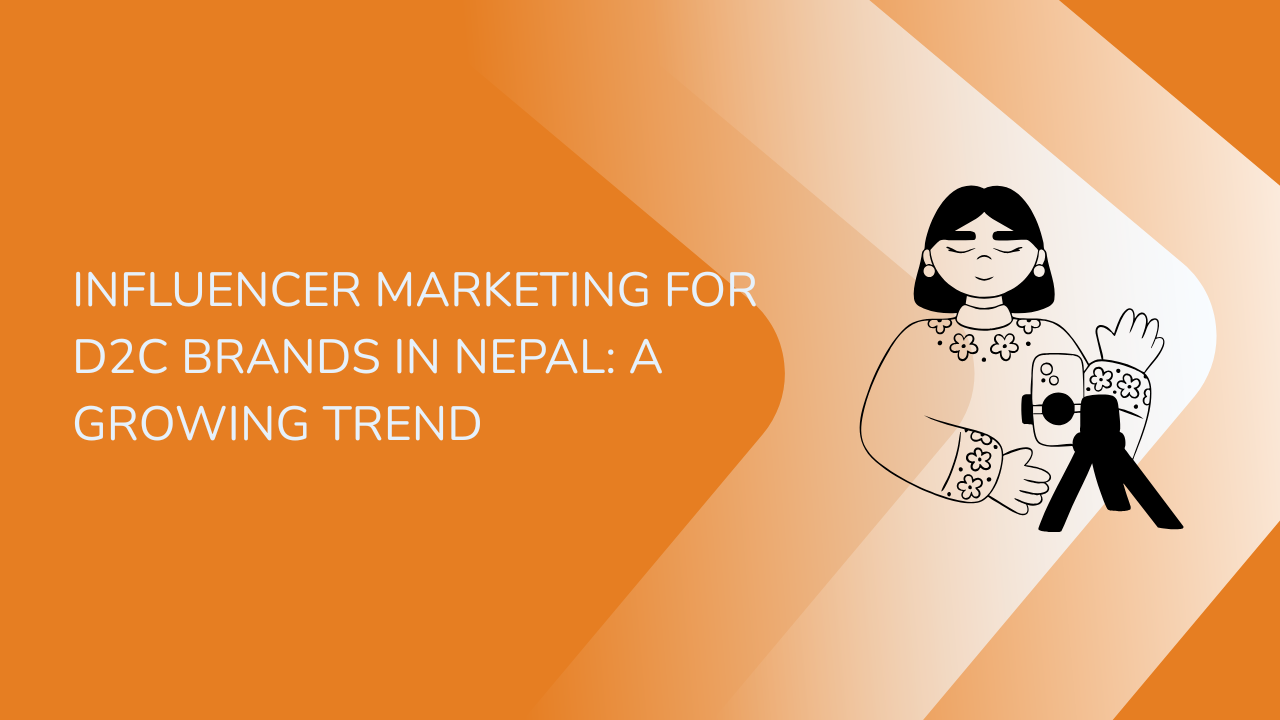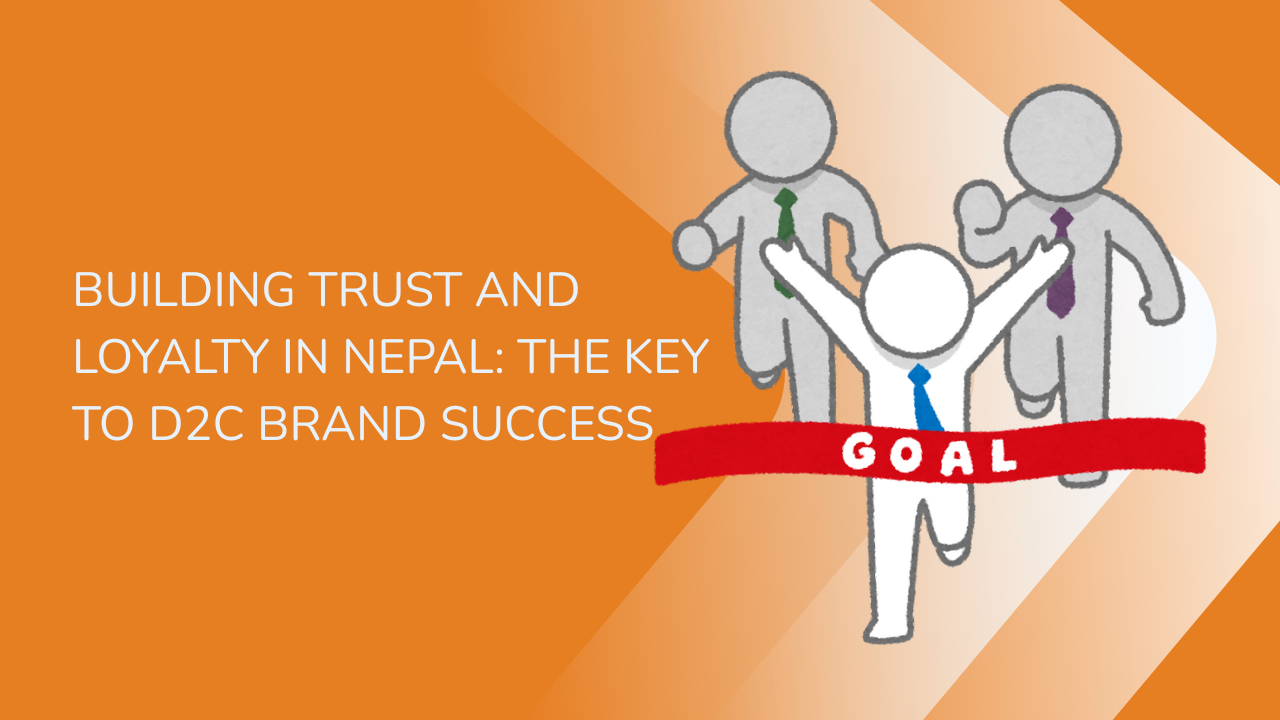Share this Article
In recent years, Direct-to-Consumer (D2C) brands have become a major player in the global retail landscape, offering a unique and streamlined approach to sales by cutting out intermediaries. For businesses in Nepal, a country where e-commerce is still developing, building consumer trust and loyalty is an essential part of navigating the marketplace. As online shopping continues to grow in popularity, D2C brands face the challenge of establishing themselves as trustworthy, reliable, and customer-focused companies. While the growth of online shopping in Nepal is promising, the customer base remains cautious, making trust-building strategies crucial for brand success.
This blog discusses effective strategies that D2C brands in Nepal can use to build trust and loyalty among their customer base. As Nepal’s e-commerce sector matures, brands must adapt to consumer behavior and expectations, focusing on customer experience, service reliability, and authenticity. By addressing these key elements, D2C brands can successfully position themselves as trusted and beloved names in Nepal’s expanding online marketplace.
1. Providing Exceptional Customer Service
One of the most important pillars of building trust with Nepali consumers is through exceptional customer service. In a market where many people are new to online shopping or may be hesitant to engage with unfamiliar brands, delivering a superior customer service experience can set a D2C brand apart from its competitors. For consumers in Nepal, issues such as delivery delays, product quality discrepancies, and customer service accessibility are common concerns when shopping online. Brands that can manage these challenges effectively will gain a competitive advantage by fostering consumer trust and ensuring repeat business.
How D2C Brands Can Use Customer Service to Build Trust:
- Timely and Reliable Delivery:
One of the primary concerns of Nepali online shoppers is the reliability of delivery services. In a developing e-commerce market like Nepal, customers often worry about whether their products will arrive on time, especially given the logistics challenges in remote areas. D2C brands can build trust by working with reliable courier services, offering accurate delivery timelines, and providing real-time tracking options for customers. By ensuring timely deliveries, brands can reduce customer anxiety and improve their reputation for dependability.
- Proactive and Responsive Customer Support:
Customer service is not just about resolving issues but also about creating positive experiences from the start of the shopping journey. Brands in Nepal need to offer accessible and responsive customer support. Whether it’s handling customer inquiries via phone, chat, or email, ensuring that support staff are well-trained and responsive to issues can make a big difference in customer perception. Providing quick responses to questions or complaints will signal to consumers that the brand values their time and experience.
- Hassle-Free Returns and Exchanges:
A major obstacle for many consumers when shopping online is the fear of not being able to return or exchange products. Nepali consumers, like many others, prefer the ability to return items if they are unsatisfied. D2C brands can mitigate this concern by offering hassle-free return policies. Transparent information about returns, exchanges, and refunds can increase customer confidence in the brand, leading to a higher likelihood of purchase and repeat transactions.
2. Ensuring Secure and Transparent Payment Options
In Nepal, cash-on-delivery (COD) has historically been the preferred payment method, especially for those who are wary of online transactions. While digital payments are on the rise, many Nepali consumers remain cautious about sharing their financial information online due to concerns about security. This makes it critical for D2C brands to offer multiple payment methods and ensure that transactions are safe, secure, and transparent.
How D2C Brands Can Build Trust with Payment Security:
- Multiple Payment Methods:
D2C brands must recognize that their customers may have different preferences when it comes to payment. For some, cash-on-delivery is still the most reliable method, while others may prefer digital payment options such as mobile wallets, online banking, or credit cards. By offering a variety of payment methods, brands can cater to a wider audience and allow customers to choose the option that they are most comfortable with, thus reducing potential barriers to purchase.
- Secure Payment Gateways:
Ensuring the security of financial transactions is a crucial aspect of building consumer trust. D2C brands that use secure and trusted payment gateways help reassure consumers that their sensitive financial information is being handled safely. Brands should clearly communicate that they utilize encrypted payment systems and reputable payment providers. This transparency can help reduce fears surrounding online payments and make consumers feel more comfortable making digital transactions.
- Clear Pricing and No Hidden Costs:
Nepali consumers are often wary of hidden charges, especially when it comes to shipping fees or unexpected taxes. D2C brands that offer clear, upfront pricing—including any taxes, shipping costs, or handling fees—help build trust with their customers. Brands should avoid hidden charges that may surprise customers at checkout, as these can cause frustration and erode trust. By offering full transparency regarding pricing, brands foster an environment of honesty and reliability, which is essential for retaining customer loyalty.
3. Building Emotional Connections with Consumers
To truly build customer loyalty, D2C brands must go beyond transactional relationships. In Nepal, where consumers are increasingly seeking products that align with their personal values and lifestyle, it is essential for brands to create emotional connections. By telling compelling stories, engaging in socially responsible initiatives, and delivering on the promises they make, brands can foster a deeper sense of connection with their customers.
How D2C Brands Can Build Emotional Loyalty:
- Authentic Storytelling:
Nepali consumers value authenticity. D2C brands that can effectively communicate their brand story, values, and mission are more likely to connect with consumers on a deeper level. Whether it’s highlighting the journey of the brand’s founder, showcasing sustainable production practices, or celebrating the artisans who make the products, brands that share their story in a transparent, relatable way create stronger bonds with customers. Brands like Woven, which focuses on sustainable fashion and ethical labor practices, successfully connect with consumers by sharing the stories of their makers and the positive impact their purchases have on local communities.
- Social Responsibility and Ethical Practices:
Nepali consumers, particularly the younger generation, are becoming more socially conscious and increasingly seek brands that align with their values. Brands that contribute to social causes, such as supporting local artisans, promoting environmental sustainability, or contributing to charitable initiatives, tend to resonate more with consumers. By showing that they care about more than just profits, brands can foster a sense of loyalty among their customers. For example, D2C brands that focus on eco-friendly products, such as sustainable clothing or biodegradable packaging, are more likely to attract a loyal following among environmentally conscious shoppers.
- Personalization and Customer Experience:
Personalizing the shopping experience can go a long way in building emotional loyalty. D2C brands can use customer data to offer personalized product recommendations, exclusive offers, or tailored communications. By creating a more personalized and relevant shopping experience, brands can show consumers that they understand their needs and preferences. Personalization can make customers feel valued and appreciated, leading to increased brand loyalty and repeated business.
4. Leveraging Social Proof and Influencer Marketing
In Nepal, like in many other markets, word-of-mouth and social proof are powerful tools for building trust. Consumers often rely on recommendations from friends, family, or trusted figures in their social circles when making purchasing decisions. D2C brands can leverage social proof to demonstrate the quality and reliability of their products and services, as well as to create positive brand associations.
How D2C Brands Can Use Social Proof to Build Trust:
- Customer Reviews and Testimonials:
Product reviews and customer testimonials are essential in helping potential customers make informed decisions. By including real, positive feedback from satisfied customers, D2C brands can establish credibility and demonstrate the quality of their products. Nepali consumers often rely on reviews before making a purchase, so showcasing authentic reviews on product pages can be an effective way to build trust. Additionally, responding to both positive and negative reviews in a professional and helpful manner can further build consumer confidence in the brand.
- Influencer Partnerships:
Influencer marketing has become a dominant strategy for building trust in Nepal’s online market. Local influencers, particularly those with large followings on platforms like Instagram and YouTube, can provide brands with a level of credibility that traditional advertising cannot. By collaborating with influencers who align with their values, D2C brands can tap into a wider audience and gain the trust of consumers who look to these figures for product recommendations. Influencers can create engaging content that showcases the brand in an authentic and relatable way, helping to build consumer confidence.
- User-Generated Content (UGC):
Encouraging customers to create content that features the brand—whether it’s photos, reviews, or videos—can help build social proof and attract new customers. User-generated content serves as an organic form of advertisement and is perceived as more authentic and trustworthy than traditional marketing messages. D2C brands can encourage customers to share their experiences on social media and use branded hashtags, which can help amplify the brand’s message and foster a sense of community.
5. Ensuring Consistency in Product Quality and Brand Messaging
Consistency is key in building trust and loyalty. Nepali consumers, like others, expect a consistent level of quality in the products they purchase, as well as consistency in the messaging a brand delivers. D2C brands that deliver on their promises, maintain high-quality standards, and present a unified brand message are more likely to earn the trust and loyalty of customers.
How D2C Brands Can Ensure Consistency:
- Reliable Product Quality:
Quality control is essential in ensuring that the products consistently meet customer expectations. Nepali consumers are particularly discerning about product quality, and even a small deviation from promised quality can lead to a loss of trust. D2C brands must invest in quality assurance practices to ensure that each product they deliver lives up to the brand’s standards. Brands that maintain a reputation for consistently offering quality products are more likely to retain loyal customers.
- Clear and Unified Brand Messaging:
From marketing campaigns to customer service interactions, D2C brands need to maintain a consistent message that aligns with their values and mission. Whether it’s communicating sustainability, affordability, or innovation, the messaging should be clear and present across all touchpoints with the consumer. A unified message helps customers understand what the brand stands for and creates a stronger connection with them, ultimately building long-term loyalty.
6. Engaging with Customers on Social Media and Content Platforms
In Nepal, social media platforms like Facebook, Instagram, and YouTube play a significant role in shaping customer experiences and perceptions. D2C brands can leverage these platforms not only for marketing and customer service but also for building deeper connections with their audience.
How D2C Brands Can Engage with Customers on Social Media:
- Active Engagement:
Brands that engage actively with their customers on social media platforms create a sense of community and make customers feel heard and valued. By responding to comments, answering questions, and even engaging in casual conversations, brands can foster positive relationships with their followers. This level of engagement helps build trust and loyalty, as customers appreciate a brand that takes the time to interact with them personally.
- Posting Relevant and Engaging Content:
Consistent posting of relevant, informative, and entertaining content on social media keeps customers engaged and informed about new products, offers, and brand updates. D2C brands that maintain an active presence on social media platforms create a sense of connection and are more likely to stay top-of-mind for their customers. Content can range from product demonstrations and tutorials to customer success stories and behind-the-scenes glimpses of the brand.
Conclusion: The Road to Building Trust and Loyalty in Nepal’s E-Commerce Market
As Nepal’s e-commerce market continues to evolve, D2C brands must prioritize building trust and loyalty with their consumers. By focusing on exceptional customer service, offering secure payment options, creating emotional connections, leveraging social proof, maintaining product consistency, and engaging with customers through social media, brands can carve out a strong position in Nepal’s growing online marketplace.
Building trust and loyalty is a long-term investment, but by implementing the strategies outlined above, D2C brands can ensure that their relationships with customers are grounded in trust, reliability, and mutual respect. These strategies are the foundation upon which lasting brand success in Nepal can be built.
Categories:
Success Stories & Case Studies
Tags:
strong brand







